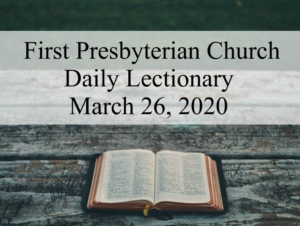
Second Reading 1 Corinthians 12:12-26
12For just as the body is one and has many members, and all the members of the body, though many, are one body, so it is with Christ. 13For in the one Spirit we were all baptized into one body – Jews or Greeks, slaves or free – and we were all made to drink of one Spirit.
14Indeed, the body does not consist of one member but of many. 15If the foot would say, “Because I am not a hand, I do not belong to the body,” that would not make it any less a part of the body. 16And if the ear would say, “Because I am not an eye, I do not belong to the body,” that would not make it any less a part of the body. 17If the whole body were an eye, where would the hearing be? If the whole body were hearing, where would the sense of smell be? 18But as it is, God arranged the members in the body, each one of them, as he chose. 19If all were a single member, where would the body be? 20As it is, there are many members, yet one body. 21The eye cannot say to the hand, “I have no need of you,” nor again the head to the feet, “I have no need of you.” 22On the contrary, the members of the body that seem to be weaker are indispensable, 23and those members of the body that we think less honorable we clothe with greater honor, and our less respectable members are treated with greater respect; 24whereas our more respectable members do not need this. But God has so arranged the body, giving the greater honor to the inferior member, 25that there may be no dissension within the body, but the members may have the same care for one another. 26If one member suffers, all suffer together with it; if one member is honored, all rejoice together with it.
Everything sounds different in light of the events of the past several weeks, including Paul’s call to unity in the Corinthian church. The problem in Corinth is division. People are following different teachers, creating status hierarchies in the church based on who baptized who. Social divisions are creeping into worship, with richer members taking communion as a part of their fellowship meal and excluding the poor. Cosmopolitan public figures are continuing some pagan practices, confusing newer and often less connected members. In short, things are a mess. Corinth has always been a good stand-in for mainline churches. We too worry about our relationship to the culture—are we too emmeshed in its successes, or characterized by things separate from our baptismal identity? Churches in America often short-circuit problems of social differentiation and belonging because our churches are already segmented on these lines. Often (and too our shame) being Presbyterian in this country has to do with things like education and access to social capital and ethnic and racial identity as it does a deep, Gospel-led resonance. But something like, say, coronavirus, can shake us out of our complacency. All of a sudden our privilege shrinks before something that threatens life, regardless of sociological factors. Rich and poor can suffer together. The quarantine, too, reflects some of Paul’s thinking; we know that we have among us some members who need protecting—who, whether for reasons of age or illness have greater levels of threat. These are the ones we show care for as we isolate. Our isolation is a sign of our solidarity—“if one member suffers, all suffer together with it.” It recalls something of C.S. Lewis, “a friend halves our sorrow and doubles our joy.” This is what we’re doing as a church, cutting our sorrow into a hundred and fifty pieces so that we can bear it together. Just think of the joy when we’re together again.
Gracious God, we pray that you will be with us, even as we are separate from one another. Unite us by your Spirit, that we would have the strength to carry what we must on behalf of others, and prepare to receive the joy of your promise, whenever it appears, in Jesus Christ, our Lord. Amen.
